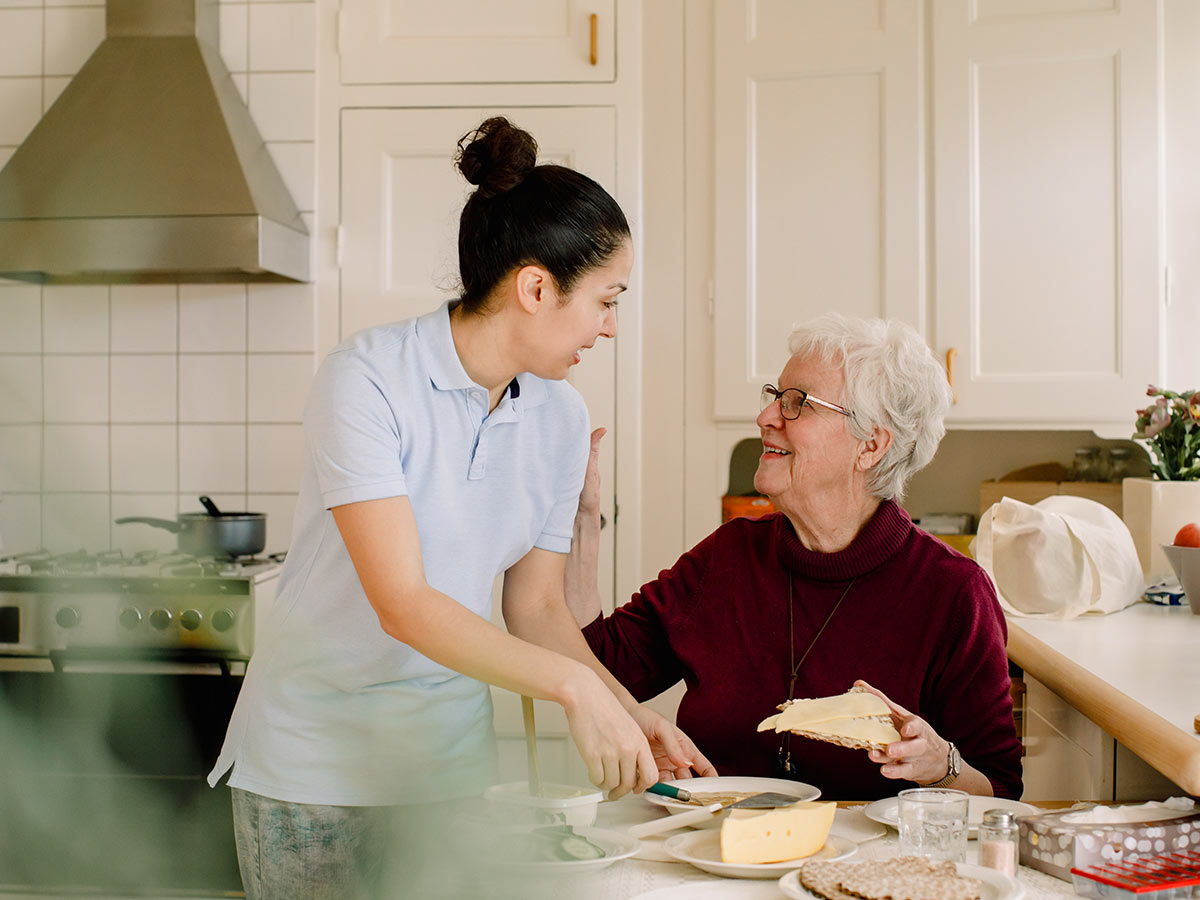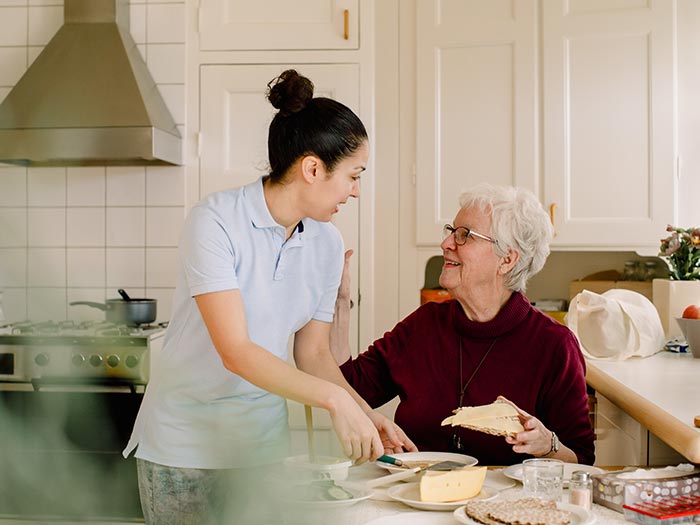
3 tips that can help retirees stay financially independent longer
 Having a family member available to assist with care can help keep aging Canadians at home longer into their retirement (Getty Images/Maskot)
Having a family member available to assist with care can help keep aging Canadians at home longer into their retirement (Getty Images/Maskot)
For many Canadians nearing retirement, COVID-19 has altered how they see themselves living out their senior years.
According to CPA Canada’s Canadian Finance Study 2020, one in three Canadians say the pandemic has negatively impacted their personal finances, with 21 per cent of respondents revealing they plan to retire later due to the pandemic.
Meanwhile, a recent survey conducted by Ryerson University and the National Institute for Aging (NIA) concluded that almost 100 per cent of Canadians 65 years old and older plan to support themselves to live independently in their homes for as long as possible.
Given these sentiments, how aging Canadians plan and save for these years is ever more pertinent, experts say. Here are three tips to help retiring clients stay financially secure at home longer.
1) EVALUATE SAVINGS
According to the Canadian Finance study, 31 per cent of participants said their incomes had declined while 30 per cent said their savings had decreased due to COVID-19.
Another CIBC poll, conducted in October, reported that 40 per cent of Canadians are concerned about the impact COVID-19 will have on their savings and retirement plans, while 20 per cent of those over the age of 55 said they had not been able to contribute to retirement savings since the pandemic began.
Given this persistent uncertainty, CPA Stefanie Ricchio, founder of the Modern Accountant, advises those nearing retirement to meet with a financial professional, if they haven’t already, to discuss their savings strategy and, if still employed, discuss their retirement income and savings strategies.
“We don’t know for certain how long COVID will cause this financial impact on the economy,” she says. “It may be time for those nearing retirement to evaluate their jobs to the best of their ability against their retirement savings plans.”
Keep in mind, Ricchio adds, that once fully retired, you are no longer earning money, restricting your ability to save. Weigh your savings against government benefits, pensions and any additional funds you may be privy to, she recommends.
“You don’t know what the glass is going to look like after retirement, when you’re not saving money anymore. There’s no extra for the most part ... which is why people aren’t retiring at 65,” she says.
Your savings analysis, adds Michael Nicin, executive director of the NIA, should also consider the longer term and the potential for health issues to arise. Whether you plan to stay at home and access homecare or move into a care facility, those relative costs should be considered.
“The vast majority of Canadians without a pension plan rely on government sources of income for retirement,” he says. “Most Canadians can’t afford to purchase their own long-term care ... homecare is [also] largely out of pocket ... Canadians are unlikely to be able to rescue themselves [solely] out of their own pockets.”
When it comes to offsetting healthcare, keep in mind, dependent on where you reside in Canada, healthcare costs, including prescription drugs, for example, may be offset through provincial benefit programs or through employee group insurance plans, which still offer benefits to those who have retired. Provincial programs also exist to assist with basic long-term care accommodations and some home-care costs.
2) SUPPLEMENT INCOME
If savings are an issue for those nearing retirement, as studies suggest, generating extra income now should be a top priority, experts say.
Beyond traditional sources such as savings, private pensions and government support, including CPP and OAS, aging Canadians should look for other ways to supplement earnings, Ricchio recommends.
Obvious avenues include remaining employed full- or part- time, but there are options outside of the labour force. According to the Canadian Finance study, 19 per cent of people plan on selling their homes within the next year to use as retirement money, while another 19 per cent plan to downsize. Real-estate adjustments, such as downsizing or converting extra space like a basement into a rental property, can reduce the cost of living, says Ricchio. Accessing loans may also be an option with strategic planning. But it’s important to weigh any implications, such as leaving behind an unpaid mortgage after you’ve passed on, or tapping into inheritance funds, she advises.
“What is the offset of that?” asks Ricchio. “It’s a conversation to have with your children because once the home is sold, there is an obligation to pay out the balance of the mortgage and [their] inheritance could be reduced.”
3) CONSIDER CARE OPTIONS
According to the NIA study, 70 per cent of Canadians 65 years of age and older reported that COVID-19 has changed their opinion on whether they’d arrange for themselves or an older loved one to live in a nursing or retirement home.
However, that same survey indicates that just 43 per cent of Canadians are personally and financially prepared to become a caregiver for an aging family member, if needed.
Aging Canadians planning to stay at home should determine, to the best of their ability, their care options based on availability, affordability, where they will live and who will be accessible to them—before they need to put their plans into practice, experts say. Do the cost of care options align realistically with your household income, expenses and budget?
The demand for homecare is expected to increase significantly, the NIA projects. In its report, “The Future Co$t of Long-Term Care in Canada”, released October 2019, a baseline projection shows that, by 2050, there will be approximately 120 per cent more older adults using home-care support and approximately 30 per cent fewer close family members—spouses and adult children, for example—available to provide unpaid care.
In preparation, Ricchio recommends establishing a contingency plan that lays out your preferences should you need to move to a hospital or long-term care facility and lists the financial resources available to support them.
This “planning ahead” should also include creating a will, ensuring it remains up-to-date, and appointing a power of attorney to manage your finances and health-related matters should you become unable to do so, or pass away.
“Unfortunately, it’s not impossible that something will happen that will force us out of our homes ... or that someone could pass away unexpectedly,” she says. “This is where awareness comes into play and being able to have those conversations about the choices you have to make.”
PERSONAL FINANCE DURING A PANDEMIC
One in three Canadians is concerned about COVID-19’s impact on their finances, according to CPA Canada’s Canadian Finance Study 2020. If you lost your job, this advice will help you deal with the situation. And for further support during the pandemic, consult these financial literacy resources to help manage your money.